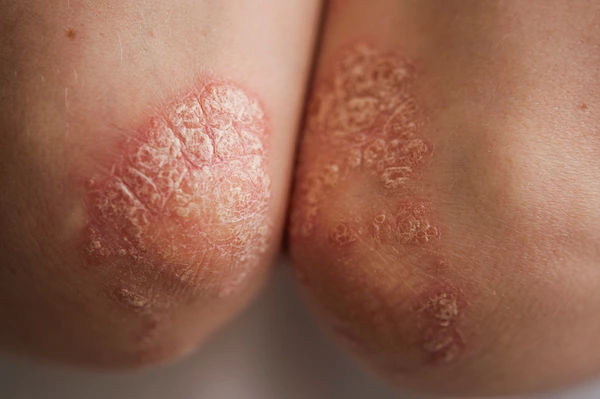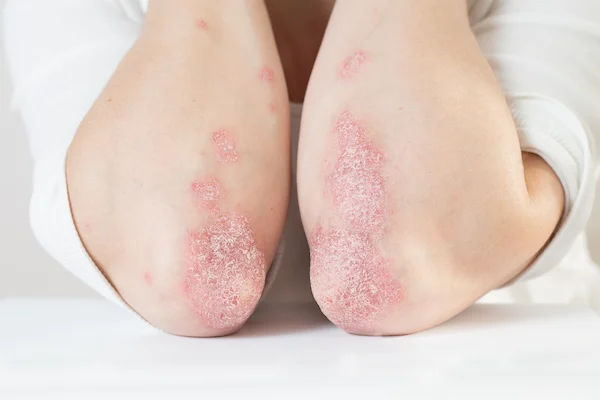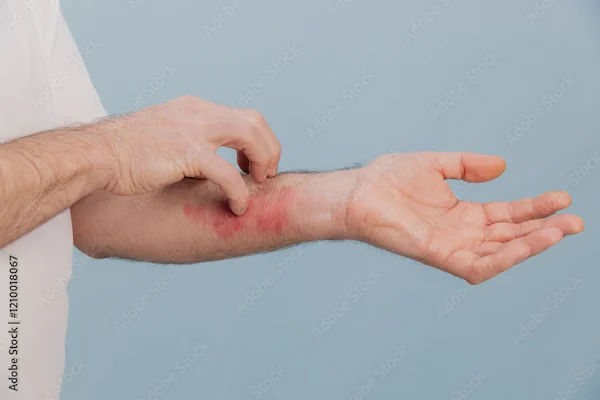Psoriasis Rash: Causes, Symptoms, Treatment Options And Lifestyle Tips
Learn about psoriasis rash, its causes, symptoms, and treatment options. Discover lifestyle tips to manage and improve your skin health effectively.

Written by Dr Sonia Bhatt
Last updated on 3rd Jul, 2025
Psoriasis is a chronic autoimmune condition that affects millions of people worldwide. One of the most visible manifestations of psoriasis is the psoriasis rash, which can cause significant discomfort and emotional distress. Psoriasis rash can appear through cycles, flaring for a few weeks or months, then subsiding or even going into remission. Understanding the causes, symptoms, treatments, and lifestyle adjustments for managing psoriasis rashes can empower individuals to live more comfortably despite the challenges of this condition. In this article, we'll explore what a psoriasis rash is, its causes, symptoms, and available treatment options.
What is Psoriasis Rash?
Psoriasis rash refers to the skin manifestations of psoriasis, which appear as red, scaly patches. These rashes can occur anywhere on the body but are most commonly found on the elbows, knees, scalp, and lower back. The severity of the rash varies from person to person, ranging from minor patches to major eruptions covering large areas of the body.
Common Types of Psoriasis
Several types of psoriasis can cause a psoriasis rash. The most common include:
Plaque Psoriasis: Red, raised patches with silvery scales, often found on the scalp, elbows, knees, and lower back.
Guttate Psoriasis: Small, drop-shaped spots, typically appearing on the trunk, arms, and legs.
Inverse Psoriasis: Smooth, red patches in skin folds, such as the armpits, groin, or under the breasts.
Pustular Psoriasis: White, pus-filled blisters surrounded by red skin.
Erythrodermic Psoriasis: A rare and severe form characterised by widespread redness and shedding of skin.
What Causes Psoriasis Rash?
Psoriasis occurs when the immune system mistakenly attacks healthy skin cells, causing them to multiply at an accelerated rate. This rapid turnover of skin cells leads to the buildup of dead cells on the skin's surface, resulting in the characteristic psoriasis rash. While the exact cause of psoriasis rash is unknown, several factors can trigger flare-ups, including:
Genetics: A family history of psoriasis increases the risk of developing the psoriasis rash.
Infections: Certain infections like strep throat can trigger psoriasis rash.
Injuries: Skin injuries, such as cuts or burns, can lead to the development of psoriasis rash in the affected area.
Stress: Emotional stress is a common trigger for psoriasis rash flare-ups.
Lifestyle Factors: Smoking and excessive alcohol consumption can worsen psoriasis rash symptoms.
Symptoms of Psoriasis Rash
The symptoms of a psoriasis rash can vary depending on the type of psoriasis. Common symptoms include:
Red, inflamed patches of skin covered with silvery-white scales.
Itching and burning sensations in the affected areas.
Dry, cracked skin that may bleed.
Thickened, pitted, or ridged nails in cases of nail psoriasis.
Joint pain and swelling in individuals with psoriatic arthritis
Psychological Impact of Psoriasis Rash
Living with a psoriasis rash, especially when it appears in visible body areas, can significantly impact mental health. The discomfort, itching, and visible nature of the psoriasis rash can lead to feelings of self-consciousness, anxiety, and depression. Many people with psoriasis rash experience lowered self-esteem and may avoid social situations because of their appearance.
Seeking emotional support through therapy or joining a support group can help manage these feelings. Practicing self-compassion and focusing on overall well-being can also provide relief. If you are struggling with the emotional impact of psoriasis rash, talk to your healthcare provider about potential strategies to improve mental health.
Diagnosing Psoriasis Rash
The diagnosis of a psoriasis rash typically involves a physical examination by a dermatologist. The doctor will examine the characteristic appearance of the rash, such as its redness, scaling, and the areas affected. To confirm the diagnosis, a dermatologist may:
Review your medical history: This includes a discussion of any family history of psoriasis or autoimmune conditions, as well as previous symptoms or flare-ups.
Perform a skin biopsy: In some cases, a small sample of the skin is taken and examined under a microscope to rule out other conditions.
Blood tests: These are sometimes used to rule out other autoimmune conditions and assess whether there’s an underlying infection or systemic issue.
A proper diagnosis is essential for determining the most appropriate treatment plan and ruling out other skin conditions that may resemble psoriasis.
Treatment Options for Psoriasis Rash
Treating psoriasis rash involves a multifaceted approach that aims to manage symptoms, reduce flare-ups, and improve overall skin health. The treatment options include:
1. Topical Treatments:
These are the first line of defence and include corticosteroids, vitamin D analogues, retinoids, calcineurin inhibitors, and salicylic acid. They help reduce inflammation, slow skin cell turnover, and smooth the skin.
2. Phototherapy:
Also known as light therapy, this treatment involves exposing the skin to controlled doses of ultraviolet (UV) light. It helps slow down the rapid skin cell production and can be used for widespread psoriasis.
3. Systemic Medications:
For moderate to severe cases, systemic medications that affect the entire body may be necessary. These include oral medications such as methotrexate, cyclosporine, and acitretin, as well as biologics that target specific parts of the immune system.
4. Lifestyle Modifications:
Adopting a healthy lifestyle can significantly help manage psoriasis symptoms. This includes maintaining a healthy weight, exercising regularly, managing stress, avoiding smoking, and limiting alcohol consumption.
5. Combination Therapy:
Sometimes, a combination of the above treatments can be more effective than using a single treatment. This approach helps to enhance the effectiveness and reduce side effects.
6. Moisturizing and Skin Care:
Regular moisturising can help keep the skin hydrated, reduce scaling and itching, and improve the overall condition of the skin. Using mild soaps and avoiding harsh skin products can also be beneficial.
Diet and Psoriasis Rash
While no specific "psoriasis diet" has been proven, some individuals find that certain foods can help manage psoriasis rashes by reducing inflammation. Anti-inflammatory foods such as omega-3-rich fish, flaxseeds, and walnuts can be beneficial. Additionally, reducing processed foods, dairy, and red meat may help minimise flare-ups. Maintaining a balanced diet with plenty of fruits, vegetables, and whole grains supports overall skin health.
Alternative Therapies for Psoriasis Rash
Some individuals with psoriasis rash explore alternative therapies in addition to conventional treatments. Natural remedies like aloe vera, turmeric, or oatmeal baths may provide relief due to their anti-inflammatory properties. Acupuncture, essential oils, and herbal remedies may also be helpful for symptom management. Always consult your healthcare provider before trying alternative therapies to ensure they are safe and effective for your condition.
Managing Seasonal Psoriasis Rash Flare-Ups
Many people with psoriasis experience worsening symptoms during colder months due to dry, cold air. To manage seasonal flare-ups, it is important to:
Moisturize regularly with thicker creams to prevent skin dryness.
Use a humidifier to maintain moisture in the air.
Avoid hot showers that can further dry out the skin.
Wear soft, breathable clothing to reduce irritation.
When to Seek Medical Attention
If your psoriasis rash becomes severe, is not responding to treatments, or affects sensitive areas like the face, genitals, or joints, seek medical attention promptly. Additionally, if the rash causes significant pain, spreads rapidly, or is accompanied by other symptoms like fever, it’s essential to consult a healthcare provider.
Conclusion
A psoriasis rash can be challenging, but its impact can be minimised with the right treatment and lifestyle adjustments. By understanding the causes, symptoms, and treatment options, individuals with psoriasis can take proactive steps to manage their condition and improve their quality of life. If you are struggling with psoriasis rash, consult a dermatologist to develop a personalised treatment plan tailored to your needs.
Consult Top Dermatologists
Consult Top Dermatologists
Dr. Kavitha Killaparthy
Dermatologist
23 Years • MBBS,DIPLOMA(DERMATOLOGY,VENEREOLOGY,LEPROSY)
Hyderabad
JDS Skin & Hair Clinic, Hyderabad
Dr. Mayuri Jain
Dermatologist
11 Years • MBBS, MD Dermatology , Venereology & Leprosy
Delhi
Dr Mayuri Jain Clinic, Delhi

Dr Ekansh Shekhar
Dermatologist
10 Years • MBBS MD
Lucknow
Apollo Clinic Hazratganj, Lucknow
Dr.j Girishma
Dermatologist
6 Years • MBBS MD DERMATOLOGY
Bengaluru
Apollo Medical Center, Marathahalli, Bengaluru

Dr. Satarupa Mondal
Dermatologist
7 Years • MBBS , MD (Dermatology , Venereology & leprosy) , Diplomate (Derm.Vene.Lep)
Kolkata
Dr Satarupa Mondal, Kolkata



